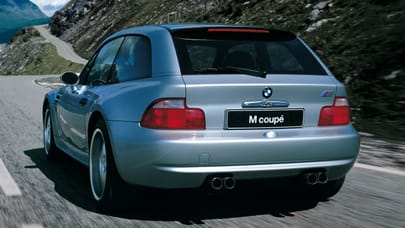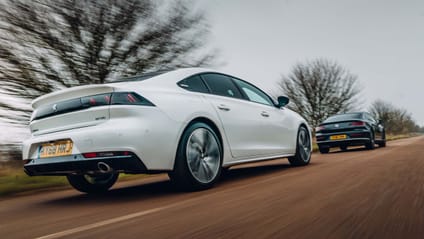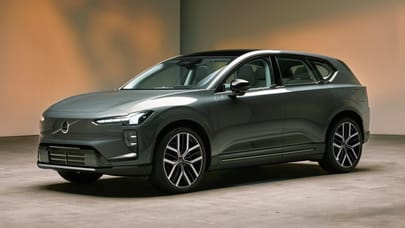
Twin test: Peugeot 508 Fastback vs VW Arteon
Everyone who wants a stylish family car has to have a crossover, right? Not so


Has the slow, undignified death of the faithful ol' saloon car been exaggerated? Peugeot and VW think so. Sure, they’re both big proponents of the modern crossover craze too. In fact, in the 3008 and Tiguan, make some of the finer examples of a duller-than-Dudley-in-December bunch. And yet, here they are offering brand new takes on the saloon car format. How quaint.
Underneath, they’re both thoroughly conventional front-wheel drivers, powered by turbocharged four-cylinder petrol engines and offered with automatic gearboxes. They seat five. They reach for 50mpg and cost just over £31k. Terribly sensible see?
Photography: Mark Riccioni
Advertisement - Page continues below
But, they’re cloaked in fastback metalwork that’s supposed to announce “I’m a member of the mile-high club” more than they shout “I’m an airport taxicab, where to guv?” With low-slung rooflines, pillarless doors and wide, chrome-festooned grins, the all-new Peugeot 508 and Passat-based (but miles more imposing) VW Arteon pose a fresh take on a niche family car. How about sitting lower and feeling sportier (sexier, even…) instead of a copy-paste crossover?
It’s a growing niche. Peugeot has completely revamped its approach from the old 508, which was as desirable as slippers. The Arteon’s new name hints that, unlike the old 'Passat CC', this is a true flagship. Kia’s in the same ballpark with the (rear-drive) Stinger. The Audi A5 Sportback and BMW 4 Series Gran Coupe are not having this market to themselves.

Right, the housekeeping. Though VW expects 60 per cent of Arteon sales to be its 2.0 TDI diesel in 148bhp, 187bhp or flagship bi-turbo 237bhp states of tune, the turning tide away from diesel has piqued our curiosity to line up a petrol-powered example against Peugeot’s equivalent. This Arteon features the base petrol engine, VW’s new 1.5-litre ‘Evo’ four-cylinder developing 148bhp when all four cylinders are running, and capable of a claimed 48.7mpg thanks to two-cylinder operation when cruising.
The Peugeot has no such cylinder-shutdown party trick, but its entry-level petrol engine – a 1.6-litre turbo four-cyl – is good for 178bhp, and equals the Arteon’s 184lb ft. Plus, the smaller, lighter French contender is claimed to be fractionally more frugal. And it’s a lot nippier, passing 62mph a second quicker than the 150kg weightier Volkswagen.
Advertisement - Page continues below
Fittingly, the Peugeot arrives in sporty, top-spec GT-line trim, while the Arteon is represented by its less overt Elegance trimline, as opposed to bodykitted R-line. The Peugeot is tauter, sportier, and its LED running lights look like a sabre-toothed robot. The VW is a dentist's dream, its mouth filled with gleaming braces. On first impression, it's a big Passat, but gaze upon it for a minute and the XXL size, the rake of the tail and lower centre of gravity give it much more presence. Now the Scirocco's dead, might this be the only pretty car VW makes?
Both are priced in the low £30ks, the Peugeot’s lower RRP advantage upended here by a greater options spend. If you want your swoopy saloon equipped with the likes of night vision, massaging seats and a 360-degree parking view, and the ability to park itself if you’re in a particularly hands-off mood (as per this specced-up test car), them’s the brakes.
This lightly optioned Arteon – equipped only with the extra of keyless unlocking and start – is comparatively bare in spec, but comes as standard with half a hundredweight of VW Group experience in infotainment on board.
Desirable specs both then, for pragmatists and posers. Let’s see which deserves to lead the saloon car’s glorious comeback...

Now, because you’re sat lower to the ground than in a crossover – particularly in the Peugeot – you’re expecting sharp dynamics, are you? Alas, handling is neither car’s forte, if we’re honest. As in, neither are driver’s cars. The VW’s front end feels ponderously heavy – in fact, the whole car feels its size, which is more executive saloon to the 508’s junior rep footprint – while the Peugeot has an artificial lightness to its steering, made all the more remote by the alien smallness of its steering wheel.

Both, predictably, are happiest in a sustained cruise. It’s the Peugeot that takes the engine laurels, deploying its extra 100ccs to good effect with a consistent power delivery and smoother high-rev behaviour. The VW’s characteristic torque-dump at around 1,700rpm is great for ex-diesel converts, but no so good news for its panicked DSG transmission. We found wheelspin when pulling away briskly was prevalent in damp conditions, which rather upsets the executive ambience. The Peugeot eight-speed auto box slurs shifts more successfully, though it’s less sharp if you’re inclined to take manual control with the cumbersome column-mounted paddles.
The VW’s longer wheelbase – and this example’s 18-inch standard rims to the Peugeot’s optional 19s – give the ride a more absorbent quality, but both make a good fist of handling scarred British roads dexterously. We noticed a tad more wind whistle around the frameless doors in this Arteon (which other examples haven’t suffered from) but overall rolling refinement is superior to the Peugeot. Close-run thing, though.

If the Arteon’s imposing exterior is an advert for VW’s Corby trouser press for panels, the interior is the flipside of VW’s personality – unimaginative and straight-laced. There’s not a great deal really wrong with it – the ergonomic control layout is peerlessly friendly and the build quality, bar a hard-plastic centre console, is impressive. But there’s very little to stand it apart from a Passat’s dashboard. Even the clock looks like one you’d find in an exam hall, not on the wrist of a leading man.
Advertisement - Page continues below
Where the VW claws it back is in space. Up front, it’s already more open than the cocooning Peugeot, but the rear quarters are truly vast, thanks to the car’s substantial length. If you’re carrying adult rear passengers the VW is leagues ahead, with bigger doors, superior visibility and genuine five-seater ability, thanks to the rear middle seat not being much higher-perched than the flanking pair.

The 508’s not as roomy, as it’s a smaller car. But it looks and feels more expensive. Its multi-configurable digital dials are less fussy, its choice of real metal and carbon-effect surfaces more thoughtful, and boy does it feel special. Part Lamborghini, part lux saloon, part spaceship. It’s a real wow-cabin. That said, you’ll have to grow to love some of the more suspect packaging, like the hidden USB sockets and charging tray. Floating centre consoles are great, until you leave your phone behind every time you get out out the car.
Meanwhile, the touchscreen’s graphics aren’t as sharp as the VW’s, and it’s laggier. Which is hardly ideal when it’s where the climate controls live. No knobs or buttons to make it hot or colder… just a screen, which freezes now and again. Brrr.
Advertisement - Page continues below
It’s improved on say, a Peugeot 308’s Windows 98 interface, but still not a VW Group-rivalling system. Live with the Pug and you’d likely get used to some foibles. But hop in after the Arteon and it’s almost wantonly contrary, and to be honest, a bit too tricky for its own good.
Thing is, it’s worthwhile persevering, because the world needs wacky French cars. We need variety, and imagination. You can’t imagine anyone thinking of a great joke or a compelling screenplay while travelling in an Arteon. It’s just too dour. Which of these two you prefer may well come down to your own personality, and whether you prefer form and function to intersect.

As you can see in the specs below, the lighter Peugeot should be a touch more frugal, but on test it returned 34.8mpg to the VW’s 37.7mpg, and the VW’s four litres of extra fuel tank elongate its potential range further. The transition between two-cyl and four-cyl running is imperceptible too. Perhaps because you’re too busy trying to coax sense out of the gearbox.
Though the VW will be a tad cheaper to lease on account of better residual values, it’s a tax band higher, so the first year’s tax is forty quid up. Peugeot has done its homework with the 508, so unlike big French cars of old, the ownership experience ought not to be ruinous.

And so, though there is a winner and a runner-up here, there’s no doubt that 2018’s interpretations of a desirable saloon car prove there’s life in the not-quite-three-box sedan yet. The Peugeot in particular is a spectacular leap from the ungainly, nondescript old 508. It doesn’t deserve to be relegated to a life of battered Parisian taxi service – its design inside and out is too daring, the build quality too high, the general air of modernity too strong.

But, VW’s experience in this sector shines through in areas that will make the Arteon a tad less of a pain to live with. It puts its extra length to massive effect indoors, and predictable though it’s cabin layout may be, it’s never frustrating to operate. Once or twice, the (more refined) 508’s cabin will cause a furrowed brow, and you’ll long for it to be ten per cent less obtuse. You'd prefer the Arteon's quieter cruising manners to the 508's slightly more intelligent gearbox, day by day. Add in the VW’s cheaper running costs and it takes a very close-run victory over the beguiling, mega-likeable Peugeot. Now, onwards to glorious rebellion over the unruly hordes of crossovers.

Peugeot 508 Fastback GT Line 180 EAT8 Auto
£31,239 / £36,964 as tested
1598cc four-cyl turbo, 178bhp, 184lb ft
8spd auto, FWD
0-62mph in 7.9sec, 155mph
49.6mpg (34.8mpg on test), 125g/km CO2
1420kg7/10

VW Arteon Elegance 1.5 TSI EVO 7spd DSG
£31,885 / £34,240 as tested
1498cc four-cyl turbo, 148bhp, 184lb ft
7spd DSG, FWD
0-62mph in 8.9sec, 137mph
48.7mpg (37.7mpg on test), 131g/km CO2
1565kg7/10
Trending this week
- Car Review
Xpeng G6







